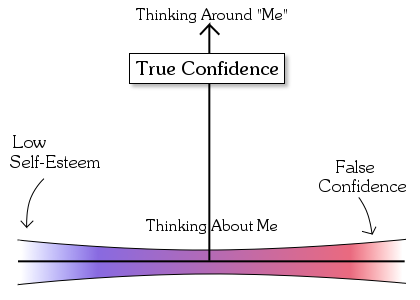I’ve noticed that confident people tend to focus less on themselves and more on their outside environment. If you have polished public speaking skills, you don’t think about getting nervous or being embarrassed. Instead you’re focused on the audience and the content of your speech. I’d argue that self-confidence is an oxymoron because total confidence means a lack of self.
If you see confidence as an absence of self, I believe it’s easier to avoid some of the pitfalls that come with the advice to “be confident”.
Is Confidence Important?
I have doubts that complete confidence is the answer. Yes, there may be some psychological benefits to believing you’re without flaws, but there are some dangerous consequences.
Arrogance can catch up to you and unrestrained confidence can cause you to misjudge plans and take unnecessary risks. The Sydney Opera House is a famous case of overconfidence. The project was originally expected to cost $7 million and finish in 1963. Ten years and 95 million dollars overbudget, the project was finally completed in 1973.
Humility can have advantages too. When you’re open to your own potential weaknesses and mistakes, you can seek to improve them. Too much confidence can stop improvement.
Arrogance is Low Self-Esteem
Bragging is usually a sign that you lack confidence in your abilities. If you feel the need to tell everyone how great you are, that is probably because you’re worried they won’t find out on their own. Arrogance can often just be a pendulum swing away from low self-esteem.
I feel this is part of the reason the advice to be confident never stuck with me. When you see that overconfidence is usually a symptom of the same disease, it becomes hard to believe that more confidence is the answer.
But if we redefine confidence to mean being so comfortable with your abilities that you don’t need to think about yourself, it takes a completely different perspective. From this outlook, you are neither boasting or self-bashing. You aren’t worried about yourself so 100% of your energy is devoted to the problem and people around you.
Generally I’ve thought of confidence as being on a scale with low self esteem on one end and arrogance on the other. Perhaps it would be better to see it as a grid, with a second dimension which resembles your level of comfort with your own abilities. This level of comfort doesn’t lie about your strengths and weaknesses, it just accepts them so completely you stop worrying about you and can focus on more important things.

I’m calling this extra dimension “true confidence” but that’s just a label. The concept, not the labels I use, are what matters.
Cultivating True Confidence and Breaking Bad Advice
From a rational perspective, any attempt to deceive yourself into thinking you’re worse or better than you actually are is dangerous. You might take costly risks or become unnecessarily cautious, depending on how you’re biased. How does this fit with the advice to “be confident”?
I think the answer lies in tweaking how you define confidence. When you see confidence as being this second dimension, it begins to make more sense. Now, instead of seeing yourself as horrible or excellent, you stop thinking about yourself at all. Everything becomes focused on the situation and environment.
I can remember hearing advice from someone that if you wanted to be incredibly social you had to “get outside your head”. When you spend your time thinking about “you” rather than just getting out there, you end up standing alone in a corner. Extroverts might have a mastery at this “getting outside your head” for social situations, but the same idea applies to every area of life.
When I write, I try to put complete emphasis on the article itself. Thinking about myself, my issues, some negative comment I received or even positive feedback is detrimental to the article. Only when I stop thinking about “me” and focus on the idea I want to cover does the writing become easy.
Cultivating this true confidence isn’t easy. There aren’t any tricks, just practice and building skills. But at least if you have a picture about what total confidence looks like, it is easier to improve.
Thought Ratio as a Measure of Confidence
I’ve noticed that the areas of my life where I’m least confident, are the ones I have wildly swinging self-oriented beliefs. When I lack confidence about something, I’ll sway from feeling mildly depressed about it to manically positive.
This pendulum swing doesn’t make much sense if you view confidence as being a linear scale. But it makes perfect sense if you see that both of these directions (feeling too good about yourself or being too hard on yourself) are symptoms of a low level of true confidence on this extra axis.
A good way to see your measure along this axis is to ask yourself how much time you spending thinking in a self-judging fashion. The judgment might be positive (“I’m great”) or bad (“I suck”). When your thoughts are mostly self-absorbed, that’s probably a sign you need to build true confidence.

 I'm a Wall Street Journal bestselling author, podcast host, computer programmer and an avid reader. Since 2006, I've published weekly essays on this website to help people like you learn and think better. My work has been featured in The New York Times, BBC, TEDx, Pocket, Business Insider and more. I don't promise I have all the answers, just a place to start.
I'm a Wall Street Journal bestselling author, podcast host, computer programmer and an avid reader. Since 2006, I've published weekly essays on this website to help people like you learn and think better. My work has been featured in The New York Times, BBC, TEDx, Pocket, Business Insider and more. I don't promise I have all the answers, just a place to start.